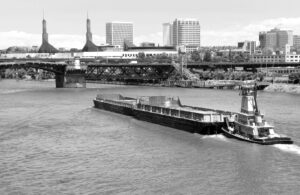The American transportation landscape owes much of its efficiency and success to the often-unseen heroes of the tugboat, towboat, and barge industry. This vital sector plays a pivotal role in moving goods safely and sustainably along America’s waterways, coasts, and oceans.
In an era where environmental stewardship is paramount, the American Waterways Operators (AWO) has taken a proactive step by releasing a set of environmental stewardship best practices tailored to this industry. These practices are designed to guide, support, and empower vessel operators in their journey towards greater sustainability. They do all this while maintaining the high standards of safety and efficiency that define the industry.
AWO’s Commitment to Sustainability
Barge transportation stands out as one of the safest and most environmentally sustainable modes of freight transportation. Jennifer Carpenter, AWO President & CEO, underlines the industry’s dedication to continuous improvement. It’s a commitment rooted in the understanding that barge transportation already possesses natural advantages in terms of fuel efficiency and greenhouse gas emissions. By embracing these best practices, AWO members aim to become even better stewards of the natural resources upon which the nation and the industry depend.
Guiding the Industry: Environmental Stewardship Best Practices
At the core of this initiative are comprehensive best practices. These practices span critical areas of focus, including water quality, energy efficiency, air quality, waste management, and corporate responsibility. The breadth of these practices ensures that they cater to the diverse operational needs within the tugboat, towboat, and barge industry. They empower vessel operators to make informed choices that lead to impactful improvements in environmental performance.
One of the central objectives of these best practices is the prevention of spills and discharges. By implementing robust preventative measures, the industry can contribute significantly to environmental conservation. Additionally, the practices prioritize embracing energy efficiency and reducing energy consumption, thereby reducing the ecological footprint. By mitigating air emissions, the industry also plays its part in promoting cleaner air quality.
Proper waste management is a critical component of responsible environmental stewardship. These best practices guide operators on minimizing their ecological impact through effective waste management strategies. Moreover, they emphasize the importance of corporate responsibility, highlighting that holistic environmental improvements extend beyond immediate operations.
AWO understands the importance of disseminating these best practices effectively. They are distributed to AWO members, ensuring that industry stakeholders have access to this invaluable resource. Furthermore, the best practices are made readily available on the AWO website, ensuring accessibility to anyone involved in the industry, from operators to regulators.
About the American Waterways Operators
As the advocate and united voice of the tugboat, towboat, and barge industry, AWO represents an industry responsible for transporting America’s commerce efficiently and sustainably. These vessels traverse waterways, oceans, and coasts, connecting vital parts of the nation’s infrastructure and economy.
Embracing the Vision of Sustainability
Supporting sustainable and efficient transportation is essential for the future. For those interested in waterway transportation or learning more about these best practices, AWO invites you to explore their website for comprehensive insights.
In the realm of waterborne commerce, safety, efficiency, and sustainability are non-negotiable. As AWO takes significant steps towards a more environmentally responsible future, it’s clear that the tugboat, towboat, and barge industry is not just meeting the challenges of our times but actively leading the way. BargeOps plays a crucial role in these efforts, ensuring that barging operations are not only safer but also more sustainable. With AWO’s environmental stewardship best practices as a guiding light, the industry charts a course towards a greener, more prosperous future.
To discover how BargeOps is advancing safer, more sustainable and efficient barging operations, contact us today.


